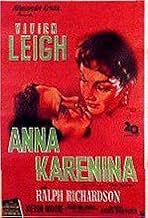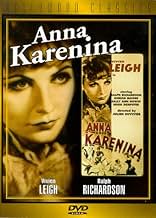IMDb RATING
6.6/10
3.1K
YOUR RATING
A married woman's affair with a dashing young officer has tragic results.A married woman's affair with a dashing young officer has tragic results.A married woman's affair with a dashing young officer has tragic results.
Niall MacGinnis
- Levin
- (as Niall Macginnis)
Featured reviews
There is very little to find fault with in this screen update of Tolstoy's classic story. Vivien Leigh is near perfection as the main character. What makes this film work is the way our tragic heroine is shown in relation to the elements that surround her: the scenes of train journeys in winter to and from Russia; and the warm weather and grandeur of a summer spent in Venice.
The supporting players are very effective and match Miss Leigh's talents in the most important scenes. The moment where Anna breaks in to see her son who has been told she died should not be missed. But the single greatest aspect of this film is the inner journey this character takes, as envisioned by Tolstoy. It is a harrowing confrontation of one's fate and delivered bravely as only this classic actress can.
The supporting players are very effective and match Miss Leigh's talents in the most important scenes. The moment where Anna breaks in to see her son who has been told she died should not be missed. But the single greatest aspect of this film is the inner journey this character takes, as envisioned by Tolstoy. It is a harrowing confrontation of one's fate and delivered bravely as only this classic actress can.
How can one possibly turn Tolstoy's novel into a "short" film? Even at 139 minutes in the uncut Korda version so much must be lost. What we end up, sad to say, is a first-rate melodrama without the psychological subtleties of the book. But that's the bad news. On the plus side, we have the sort of lavish the sky's-the-limit big, big, bigger budget production that only the Hungarian Alex Korda could have produced a few years after the world war on the sound stages of London --sets by the Russian Andreiev, costumes by the English Cecil Beaton; deep-focus photography and lighting by the French Henri Alekan ("Belle et Bete"), and music by the English composer Constant Lambert. Technically, this film contains some of the best B&W work ever done in Britian. Perhaps the greatest fault of the film is in the style of the acting. Vivian Leigh is a great beauty, very aristocratic, very British in her reserve, but when she falls in love with Vronsky she seems constitutionally incapable of the unbridled passion that Garbo brings to the role. Ralph Richardson, however, is perfect --far superior to Basil Rathbone. Richardson displays all the rigidity of Anna's husband; his enormous pride and wounded vanity; his total incapacity to understand his wife's heart. Needless to say, Kieron Moore as Vronsky tries very hard, looks wonderful in costumes, but he seems more a West-End juvenile than the great aristocrat and officer that Tolstoy depicts. Laurence Olivier would have been a perfect Vronsky. Why Korda chose not to cast him beside his wife is a mystery.
A married woman (Vivien Leigh)'s affair with a dashing young officer has tragic results.
I read the novel several years ago in all its glory, but apparently most of it failed to stick with me because watching this film felt like i was hearing the story for the first time. And with there being so many different versions of the story on film, I am surprised I had not seen one before. (Unless I forgot those, too!) This seems like it must be the definitive version. The elegance, the intrigue. This is what I picture the aristocracy to be like. I love that they engage in seances, because that is such an upper class thing to do in the late 1800s. And Vivien Leigh? The perfect casting for a lead.
I read the novel several years ago in all its glory, but apparently most of it failed to stick with me because watching this film felt like i was hearing the story for the first time. And with there being so many different versions of the story on film, I am surprised I had not seen one before. (Unless I forgot those, too!) This seems like it must be the definitive version. The elegance, the intrigue. This is what I picture the aristocracy to be like. I love that they engage in seances, because that is such an upper class thing to do in the late 1800s. And Vivien Leigh? The perfect casting for a lead.
Count Tolstoy's massive novels, "War and Peace," and "Anna Karenina" are personally quite challenging.
Here are breathtakingly crafted literary works in a spiritual context of unconstructive energy. It's quite easy to become as entranced within these "worlds" as are many music lovers within the skewed terrain of Wagner's Valhalla and Nibelungens.
Tolstoy's words pull in the reader almost hypnotically as he spins his titanic, subtle tales of societal mores conflicting with human emotions.
Many of his characters are self-absorbed and vain, and his social environments repressive and stolid, with false values that tragically dehumanize and destroy.
So it's an ultimate challenge to attempt to separate these energetic downers from their dazzling technical counterparts.
In the case of "Anna," after stripping away the polished veneer, I find characters trying to cope with their testy emotional choices while being thwarted by inhuman societal standards.
Yet "Anna" is a favorite of filmmakers, having been done countless times, with the Garbo-Selznick version the most notable. Here Vivien Leigh gives a creditable performance of this distraught heroine, with Director Julien Duvivier joining Jean Anuith in script adaptation.
Ralph Richardson and Kieron Moore are both completely substantial, and general production values are attended to with solid professionalism.
Alas, the enactment seldom tugs heartstrings and, in fact, a strangely turgid pall seems to hang over the entire production. Condensing a 900-page novel down to 2-hour running time doesn't help matters.
As for Leigh, my feeling is that she gravitated too often to "fallen woman" roles. While she portrayed them very well, they may have failed to bring her the uplift her personality seemed to desperately seek. Hers was pretty much a career of depressingly joyless female characters, which perhaps worked not to her personal advantage.
That's another matter, though; Leigh was forever the consummate, fine actress, and her legacy is one of great artistic achievement.
This version of "Anna Karenina" remains a thoughtful, worthy attempt at a near-impossible task.
Here are breathtakingly crafted literary works in a spiritual context of unconstructive energy. It's quite easy to become as entranced within these "worlds" as are many music lovers within the skewed terrain of Wagner's Valhalla and Nibelungens.
Tolstoy's words pull in the reader almost hypnotically as he spins his titanic, subtle tales of societal mores conflicting with human emotions.
Many of his characters are self-absorbed and vain, and his social environments repressive and stolid, with false values that tragically dehumanize and destroy.
So it's an ultimate challenge to attempt to separate these energetic downers from their dazzling technical counterparts.
In the case of "Anna," after stripping away the polished veneer, I find characters trying to cope with their testy emotional choices while being thwarted by inhuman societal standards.
Yet "Anna" is a favorite of filmmakers, having been done countless times, with the Garbo-Selznick version the most notable. Here Vivien Leigh gives a creditable performance of this distraught heroine, with Director Julien Duvivier joining Jean Anuith in script adaptation.
Ralph Richardson and Kieron Moore are both completely substantial, and general production values are attended to with solid professionalism.
Alas, the enactment seldom tugs heartstrings and, in fact, a strangely turgid pall seems to hang over the entire production. Condensing a 900-page novel down to 2-hour running time doesn't help matters.
As for Leigh, my feeling is that she gravitated too often to "fallen woman" roles. While she portrayed them very well, they may have failed to bring her the uplift her personality seemed to desperately seek. Hers was pretty much a career of depressingly joyless female characters, which perhaps worked not to her personal advantage.
That's another matter, though; Leigh was forever the consummate, fine actress, and her legacy is one of great artistic achievement.
This version of "Anna Karenina" remains a thoughtful, worthy attempt at a near-impossible task.
While certainly the vanities and indiscretions of upper crust Russia is examined by Tolstoy and it has been some time since I have read the lengthy novel, this version is certainly more memorable and effective than the Garbo version. I do agree with an earlier review in that Garbo herself, perhaps a bit too self-possessed and headstrong, could never represent the character of Anna, a woman carried away on passion, lust and impending tragedy.
Vivien Leigh is stunning in her facial expressions and vulnerable, almost exotic appearance, as we see her in a black gown, contrasted dramatically with other women who blend in the background to obscurity. The gowns and architecture of the era, the stark coldness and added texture of snowflakes, as a bas-relief to the portrait of Anna. Her close-ups particularly as she is in the train station in winter, foreshadowing her eventual fate.
Overall a beautiful film which is well worth viewing. Leigh is beautiful and tragic. 8/10.
Vivien Leigh is stunning in her facial expressions and vulnerable, almost exotic appearance, as we see her in a black gown, contrasted dramatically with other women who blend in the background to obscurity. The gowns and architecture of the era, the stark coldness and added texture of snowflakes, as a bas-relief to the portrait of Anna. Her close-ups particularly as she is in the train station in winter, foreshadowing her eventual fate.
Overall a beautiful film which is well worth viewing. Leigh is beautiful and tragic. 8/10.
Did you know
- TriviaVivien Leigh's costumes were made in Paris by Barbara Karinska to Cecil Beaton's designs. She was in such pain wearing them that she even went to her doctor fearing she had broken her ribs. It was subsequently discovered that the dresser had been putting the corsets on upside down.
- Quotes
Anna Karenina: My dear Korsunsky, you know very well I never dance unless I can help it.
- Crazy creditsClosing credits: "And the light by which she had been reading the book of life, blazed up suddenly, illuminating those pages that had been dark, then flickered, grew dim, and went out forever".
- Alternate versionsU.S. release version runs approximately 112 minutes. This is the version issued by Fox DVD in 2007.
- ConnectionsFeatured in Vivien Leigh: Scarlett and Beyond (1990)
Details
- Release date
- Country of origin
- Official site
- Languages
- Also known as
- Anna Karenina
- Filming locations
- Monterey, California, USA(racetrack and steeplechase scenes)
- Production company
- See more company credits at IMDbPro
Box office
- Budget
- $2,000,000 (estimated)
- Runtime2 hours 19 minutes
- Color
- Aspect ratio
- 1.37 : 1
Contribute to this page
Suggest an edit or add missing content



































